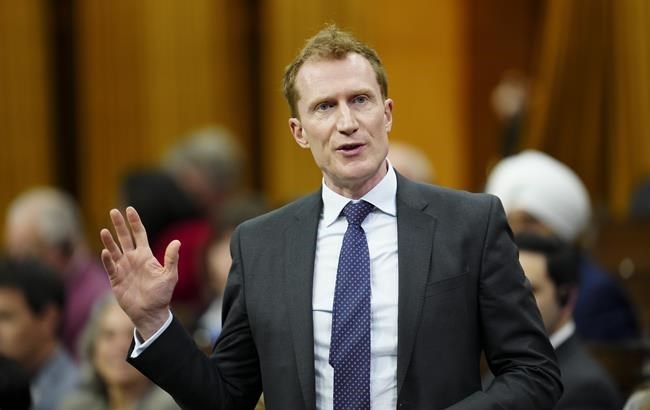OTTAWA — A parliamentary motion on the Israel-Hamas war the House of Commons passed Monday could make it harder for people seeking asylum in Canada to get out of Gaza, Immigration Minister Marc Miller said Wednesday.
He said it could make the situation worse for a Canadian program that has already been, in his words, a "failure."
The motion, initially brought forward by the New Democrats, was dramatically amended by the Liberals with NDP consent shortly before a late-night vote on Parliament Hill.
The amended version of the motion, which had been altered to reflect the 14 separate changes proposed by the Liberals, was fair and principled, Miller said.
The final version eliminated a standalone call to recognize Palestinian statehood and instead saw MPs support progress toward a peace process and a two-state solution, in keeping with existing Canadian policy.
But Miller said the motion has upset Israel's government and is likely to have consequences.
Israel's foreign minister said Tuesday that measures outlined in the motion, including the suspension of arms exports to Israel, would undermine his country's ability to defend itself — and that history would judge Canada harshly.
The government always knew the program to offer asylum to extended family members of Canadians who are in the Gaza Strip could fail, Miller acknowledged.
It was designed to offer as many as 1,000 temporary visas to people in the Gaza Strip with extended family in Canada, but the minister warned from the outset that getting people out through the tightly controlled Rafah border crossing would be a challenge.
Canada provided a list of more than 300 names of people who applied for the visa to Egyptian and Israeli border officials, but none of those people have made it across as a result of Canada's efforts.
Only 14 people have received a visa after making it across the border by other means.
The motion could have consequences for others who are waiting, Miller said.
"The adoption of that motion doesn't help getting people out," he said, noting the Israeli government has made it clear that it is watching what Canada does.
"Any actions that are seen as to be unfavourable can affect their decision-making at the highest political level," Miller said.
"And so we can't be naive as a country as to the actions that we take and the impact that can have on the ground and for actual people's lives."
Israel's ambassador to Canada, Iddo Moed, did not quell those concerns when asked about Miller's comments Wednesday.
"I just can't say anything about it at the moment," he said in an interview.
NDP immigration critic Jenny Kwan called the minister's comments "outrageous."
"Not one person has made it to Canada in safety," Kwan said.
"And now he wants to blame the NDP, for standing up for human rights, for standing up for international law and the rule of law?"
Miller said he was not saying that the motion was "a bad thing to adopt," adding it represented a "principled position" as amended.
"But the actions of the government of Canada (have) consequences. And on the particular impact of that program, I don't think that motion is necessarily a good thing."
Kwan led calls for a special immigration program to bring the extended family members of Canadians out of Gaza to safety in Canada, and has been a vocal critic of how the program has since unfolded.
She has called on the minister to lift the 1,000-visa cap, which he has pledged to do, and process applications more quickly to get people to safety.
Some people have made it out of Gaza at great cost, without Canada's help, and have completed their biometric screening — only to find themselves stuck in Egypt awaiting a Canadian visa, Kwan said.
"He cannot point the finger at anyone else but himself for that failure," Kwan said.
Miller was grilled about the program by the House of Commons immigration committee, where he repeated concerns about Canada's inability to help people get out of Gaza.
During a break in the meeting, 20 people with family in Gaza gathered around the minister to tearfully share their frustration with the program and their fear for their loved ones.
He told the committee that the program cannot be called a success.
"It doesn't mean that we should stop trying," he said.
This report by The Canadian Press was first published March 20, 2024.
— With files from Mia Rabson and Dylan Robertson in Ottawa.
Laura Osman, The Canadian Press



